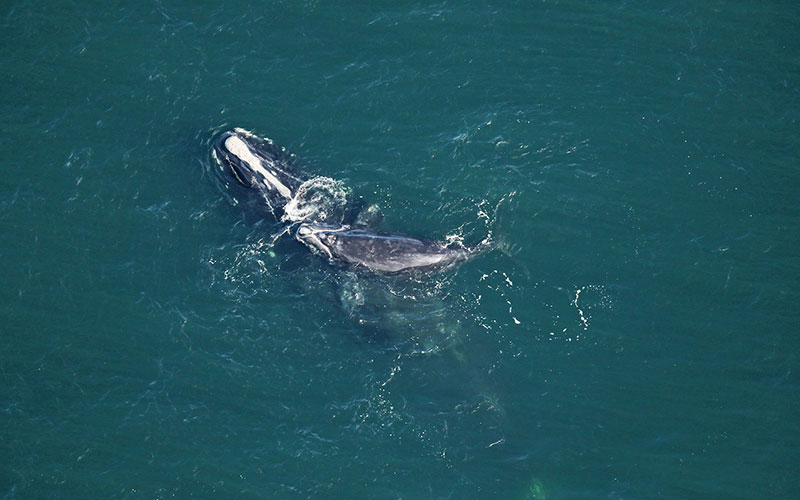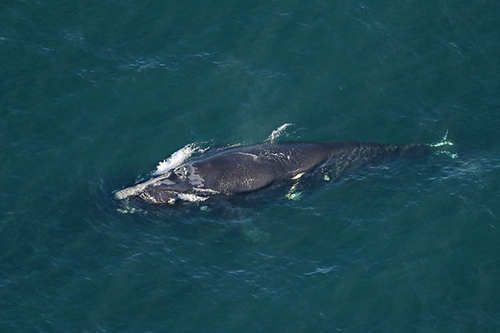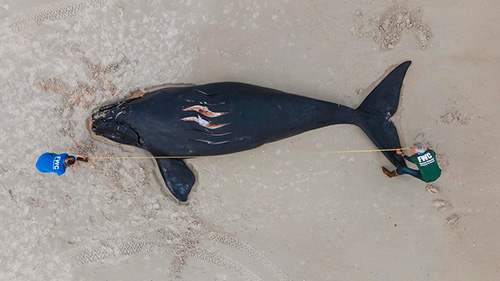
‘Infinity’ and calf were killed by a sport fishing boat off in Florida. Collisions with vessels are a leading cause of deaths for this endangered species. NOAA's proposed regulations are a step to helping prevent these tragedies. Photo: Florida Fish and Wildlife under NOAA permit #20556-01
North Atlantic right whales are on the verge of extinction – and we humans remain the biggest threat to their survival. Scientists are clear: We can’t afford to lose even one whale a year due to human causes if this critically endangered species is to recover.
Collisions with boats and ships are one of those human causes – but the terrible toll they take can be prevented. Earlier this year, NOAA drafted regulations to update speed limits for boats traveling in areas where right whales are frequently found. The revised regulations would now apply to smaller boats as well as large vessels – and make the speed limits mandatory when North Atlantic right whales are spotted in an area.
These updated regulations are critical to the survival of this critically endangered species. Yet several members of Congress are trying to subvert NOAA’s authority. Catering to special interests, members of both the House and Senate have introduced bills that would prevent NOAA from taking this necessary action until “real-time monitoring” is available to help prevent vessel collisions.
The rhetoric these Congress members are using to garner support for their bills is misleading. And their effort to legislate a federal agency’s actions sets a dangerous precedent for NOAA’s ability to carry out its mandate to enforce the Endangered Species Act.
Right Whales Cannot Wait
Right now, vessel strikes are the leading cause of death of North Atlantic right whales. In the last six years, at least 14 right whales have been killed or seriously injured by collisions with vessels in the United States and Canada. With barely 350 right whales left on the planet, we can’t lose even one right whale per year if we want to recover this incredible species.
NOAA’s new speed regulations are essential to ensure this dangerous trend doesn’t continue. Slowing vessels down to 10 knots or less – the limit set by the new regulations – is the best way to protect whales from this deadly threat. Moreover, the speed limits would only apply during the months when whales migrate to and from their calving grounds near Florida and Georgia to the northern feeding grounds.
Not to mention that collisions between boats and whales endanger humans, too. In 2021, a 54-foot sport fishing boat ran into a right whale mother and calf. The collision killed the calf and injured the mother, Infinity (who hasn’t been seen since and is presumed dead). The boat was also destroyed, endangering passengers and causing over a million dollars of damage.
NOAA’s new regulations are a practical and necessary solution – but they must be implemented fully now.

Congress’s Interference Leaves Right Whales at Risk and NOAA at Sea
The bills introduced in Congress seek to delay the implementation of the new regulations until real-time monitoring of whales is available. While that may sound reasonable, the fact is that no technologies currently available could replace the need for boaters to slow down. For example, the government could place more passive acoustic monitoring systems, or “sound boxes,” in the ocean, improving our ability to detect vocalizing whales. But feeding whales don’t talk (they’re hungry!). Neither do moms with their calves who are trying to avoid predators.
And while “tagging” whales, as we do with white sharks, sounds good in theory, serious health problems are associated with current tagging technologies for this species. That makes tagging dangerous for the whales and impractical as a monitoring tool.
The members of Congress who introduced these irresponsible bills are placing their private interests ahead of the recovery of this species. We can’t let this selfish attack on a reasonable and necessary regulation succeed.
What’s more, the whole process at play here undermines NOAA’s ability as a government agency to issue regulations like this in the future. NOAA must be able to react quickly and effectively to real problems faced by both protected species and the people interacting with them without interference from Congress.
What’s the Solution?
At the end of the day, we know that North Atlantic right whales can’t wait.
We need NOAA to finalize the new vessel speed rules immediately. Congress needs to know that the risk to both right whales and people is too high to allow collisions to continue as they have. These new rules are based on the best available science and are the least we can do to help protect this iconic species.
We cannot allow the special interests of a few powerful people to form the basis of our laws and regulations. We must act quickly to protect right whales before it’s too late. You can help.

We Must Speak Up for Right Whales – Now
This attempt by Congress to undermine a federal agency simply cannot stand.
Tell your senators and representatives to oppose Senate Bill 1833 and House Bill 4323. Let them know that you support NOAA’s proposed vessel speed restrictions and that this bill would toss aside those carefully crafted regulations and silence the thousands of voices that went into their drafting.
You can look up your legislator to give them a call or send them an email. The more of us who reach out to these lawmakers, the more likely they are to listen. We won’t let Congress stand in the way of protecting our North Atlantic right whales.



